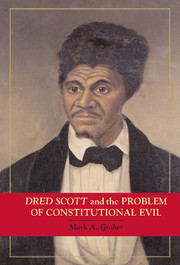PART TWO - THE CONSTITUTIONAL POLITICS OF SLAVERY
Published online by Cambridge University Press: 05 June 2012
Summary
The Civil War is commonly explained as the consequence of an “irrepressible conflict” between the sections over slavery. “Lincoln's election,” Michael Morrison insists, “genuinely reflected irreconcilable divisions in the American electorate.” Mark Brandon maintains that the antebellum constitutional order broke down when “an interpretive schism between Northern and Southern states … deepened and widened to such an extent that the two regions adopted distinctive interpretive paradigms that could not accommodate each other.” Kenneth Stampp agrees. “[T]here was no basis for sectional harmony,” he writes, “as long as Negro slavery survived and as long as Northerners used their overwhelming political power to advance their special interests at the expense of the South.”
This emphasis on “irreconcilable differences,” “interpretive schisms,” and “irrepressible conflicts” overlooks how flawed constitutional institutions and practices were as vital to Republican success as bloody Kansas. For example, had the framers mandated electoral rules of the type adopted by most contemporary democracies, Stephen Douglas or John Bell would have delivered the inaugural address in March 1861. Secession would have been postponed until a free-state coalition gained a majority of the popular vote. Differences between the slave and free states were irreconcilable in 1860 only because the constitutional system of elections did not permit moderates in both sections to effect a reconciliation.
The Constitution of 1787 sought to secure a balance of sectional power by establishing institutions thought to give both the free and slave states a practical veto on national policy.
- Type
- Chapter
- Information
- Dred Scott and the Problem of Constitutional Evil , pp. 91 - 172Publisher: Cambridge University PressPrint publication year: 2006



